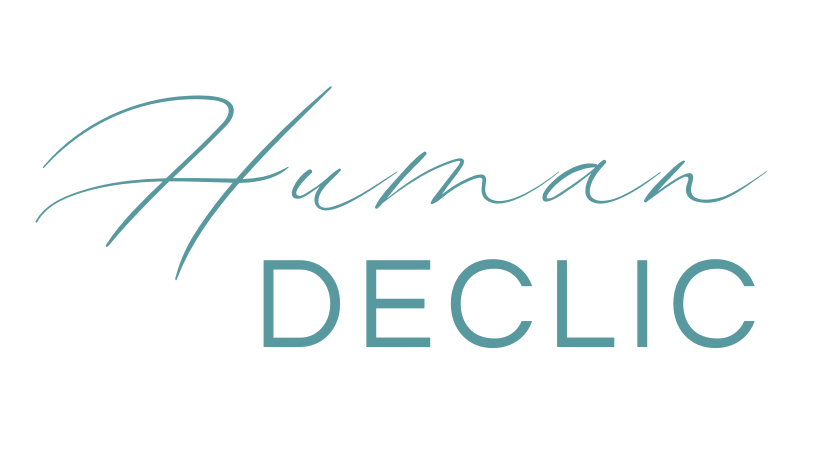“We’re onboarding a junior ASAP in agile mode to boost QVCT.”
No idea what that means? You’re not alone.
Welcome to the wonderful world of modern HR, where the local dialect is a curious blend of Franglish, acronyms, and a touch of start-up spirit. It’s a land where sentences are packed with capital letters and good intentions. Where a simple hiring project involves a “learning journey,” a “feedback loop,” and a round of “design thinking” — all before the candidate has even said hello.
But behind the buzzwords lies something very real: communication, management, motivation, and well-being at work. So should we ditch the jargon altogether, or learn to decode it so we can truly work together?
Spoiler: at Human Déclic, we’ve picked the second option — with a generous side of humor.

Welcome to the wonderful world of RH-glish
Let’s face it: the HR world has its own language. And that language has a deep, undying love for English buzzwords, especially when dressing up very practical matters with a touch of strategic modernity.
We don’t recruit anymore — we do talent acquisition.
We don’t train — we create learning journeys.
We don’t just say “good vibes at the office” — it’s all about positive corporate culture.
And feedback? Expect a full-on feedforward session in remote mode.
🤯 Still following? Congrats — you’re officially HR bilingual.
But why all this Franglish?
Because in a globalized workplace, anglicisms reassure. It makes us feel up-to-date, connected, and aligned with HQ in London or the client in San Francisco.
But somewhere along the way, we forget to translate. And that’s when things get messy.
👉 In multicultural teams, this linguistic jungle can quickly turn into a barrier to effective collaboration. Speaking English is one thing — understanding each other is another.
➡️ Curious about cultural clashes in HR? Read more:
French HR vs International Companies: How to Bridge the Gap
Acronyms galore: welcome to the HR bingo
Welcome to the land of capital letters! In HR meetings, it’s not uncommon to hear a string of acronyms that sounds more like a round of management bingo than a conversation.
➡️ “We launched a GEPP aligned with QVCT, in coordination with the CSE and RPS identified in the DUERP.”
— Translation: Is there a doctor in the room?
It’s enough to make any team member dizzy — unless they’ve got an HR survival glossary close at hand.
A few favorites from the HR acronym dictionary:
- QVT: quality of life at work (in French)
- QVCT: quality of life and working conditions
- CPF: personal training account (in France)
- GEPP: workforce and career management
- RPS: psychosocial risks
- PSSM: mental health first aid
- DUERP: occupational risk assessment document
- CSE: (employee) social and economic committee
…and that’s just the warm-up.
👉 The issue? When acronyms pile up, people may get lost in the alphabet soup. You think you’re saving time, but really, you’re just clouding the message.
➡️ Want to bring clarity back into workplace communication?
Effective communication at work: Tips for managers

HR jargon: trend or true complexity?
Let’s be fair — HR jargon isn’t just there to sound fancy. Some of it is actually useful, precise, even essential when it comes to structuring complex processes like skills management, risk prevention, or career transitions.
But when the terminology turns into a secret code only insiders understand, the message gets lost. Or worse — people feel left out.
Style vs. substance
- Talking about a “feedback loop”? Great — as long as there’s actual dialogue involved.
- Rolling out a GEPP? Fine — but if no one understands the action plan, what’s the point?
- Hosting a design thinking workshop? Awesome — unless it’s just there to look like a start-up.
In HR as in life, words should connect people.
That’s why at Human Déclic, we stand for a language that’s clear, inclusive, and alive. Not to simplify ideas, but to let them circulate and resonate throughout the organization — so everyone feels involved.
Back to basics: HR that speaks human
So, should we throw out all the HR buzzwords and acronyms? Not necessarily. Maybe we could use them with more intention and clarity.
Because behind every QVCT, GEPP, or learning journey, there are real people with needs, doubts, and talents and as the job of HR isn’t to dazzle with terminology, let’s build bridges, create meaning, and help everyone grow in a space we can actually understand.
At Human Déclic, we believe in HR more human, more grounded, more accessible. You don’t need a glossary to talk to us — just a desire to move forward, together, in the same language.
➡️ Book a meeting with Human Déclic
No buzzwords. Just real conversations.

✅ Conclusion: Do you speak fluent HR?
HR jargon is a bit like salt — used in the right amount, it enhances the flavor. But overdo it, and everything starts to taste the same.
So if you’re dreaming of an HR department that speaks your language … What if we just started by speaking simply together?




